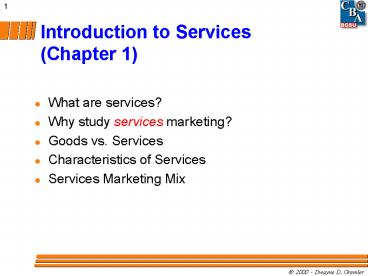Introduction to Services Chapter 1 - PowerPoint PPT Presentation
1 / 19
Title:
Introduction to Services Chapter 1
Description:
banking, investment advising, insurance. Hospitality. restaurant, hotel/motel, bed & breakfast, ski resort, rafting. Travel. airlines, travel agencies, theme park ... – PowerPoint PPT presentation
Number of Views:51
Avg rating:3.0/5.0
Title: Introduction to Services Chapter 1
1
Introduction to Services(Chapter 1)
- What are services?
- Why study services marketing?
- Goods vs. Services
- Characteristics of Services
- Services Marketing Mix
2
Marketing Definition
- Marketing is the process of planning and
executing the conception, pricing, promotion, and
distribution of ideas, goods, and services to
create exchanges that satisfy individual and
organizational objectives. - --American Marketing
Association
3
Examples of Service Industries
- Health Care
- hospital, medical practice, dentistry, eye care
- Professional Services
- accounting, legal, architectural
- Financial Services
- banking, investment advising, insurance
- Hospitality
- restaurant, hotel/motel, bed breakfast,
- ski resort, rafting
- Travel
- airlines, travel agencies, theme park
- Others
- hair styling, pest control, plumbing, lawn
maintenance, counseling services, health club
4
What are services?
- Services include all economic activities
whose output is not a physical product or
production, is generally consumed at the time it
is produced, and provides added value in forms
(such as convenience, amusement, timeliness,
comfort, or health) that are essentially
intangible concerns of its first purchaser.
5
What are services?
6
Why study services marketing?
- service-based economy
- source of competitive advantage for manufacturing
firms - deregulation in some service industries
- new technologies have created new service
opportunities
7
Percent of U.S. Labor Force by Industry
80
70
60
Percent of GDP
50
40
30
20
10
0
- Services
- Manufacturing
- Mining Agriculture
1929
1948
1969
1977
1984
1996
Year
Figure 1-2
Source Survey of Current Business, April 1998,
Table B.8, July 1988, Table 6.6B, and July 1992,
Table 6.4C Eli Ginzberg and George J. Vojta,
The Service Sector of the U.S. Economy,
Scientific American, 244,3 (1981) 31-39.
8
Percent of U.S. Gross Domestic Product by Industry
80
70
60
Percent of GDP
50
40
30
20
10
0
1948
1959
1967
1977
1987
1996
- Services
- Manufacturing
- Mining Agriculture
Year
Figure 1-3
Source Survey of Current Business, August 1996,
Table 11, April 1998, Table B.3 Eli Ginzberg
and George J. Vojta, The Service Sector of the
U.S. Economy, Scientific American, 244,3 (1981)
31-39.
9
Goods vs. Services
- Goods
- Production separate from consumption
- Standardized
- Tangible
- Nonperishable
- Services
- S
- H
- I
- P
10
Services are Different
Table 1-2
Source Adapted from Valarie A. Zeithaml, A.
Parasuraman, and Leonard L. Berry, Problems and
Strategies in Services Marketing, Journal of
Marketing 49 (Spring 1985) 33-46.
11
Product Definition
- Product
- it is everything that the customer receives in
making an exchange
12
Tangibility Spectrum
Salt
l
Soft Drinks
l
Detergents
l
Automobiles
l
Cosmetics
l
Fast-food Outlets
l
Intangible Dominant
Tangible Dominant
l
l
Fast-food Outlets
l
Advertising Agencies
l
Airlines
l
Investment Management
l
Figure 1-1
Consulting
Teaching
13
Challenges for Services
- Defining and improving quality
- Communicating and testing new services
- Communicating and maintaining a consistent image
- Motivating and sustaining employee commitment
- Coordinating marketing, operations and human
resource efforts - Setting prices
- Standardization versus personalization
14
Services Marketing Mix
- traditional marketing mix
- Product
- Place
- Promotion
- Price
- expanded mix for services
- P
- P
- P
15
People
- are the firm in the customers eye
- are a critical part of the product
- may be involved in production
- can facilitate or inhibit service performance
- can impact service encounters via their attitude,
behavior, or degree of involvement
16
Process
- the actual procedures, mechanisms, and flow of
activities by which the service is delivered - includes
17
Physical Evidence
- includes
- (1)
- background characteristics (furnishings, noise,
color) - spatial layout
- signs
- (2) tangible cues/facilitating goods that
facilitate performance or communication of the
service - examples
18
Expanded Marketing Mix for Services
Table 1-3
19
Expanded Marketing Mix for Services
Table 1-3 (Continued)































